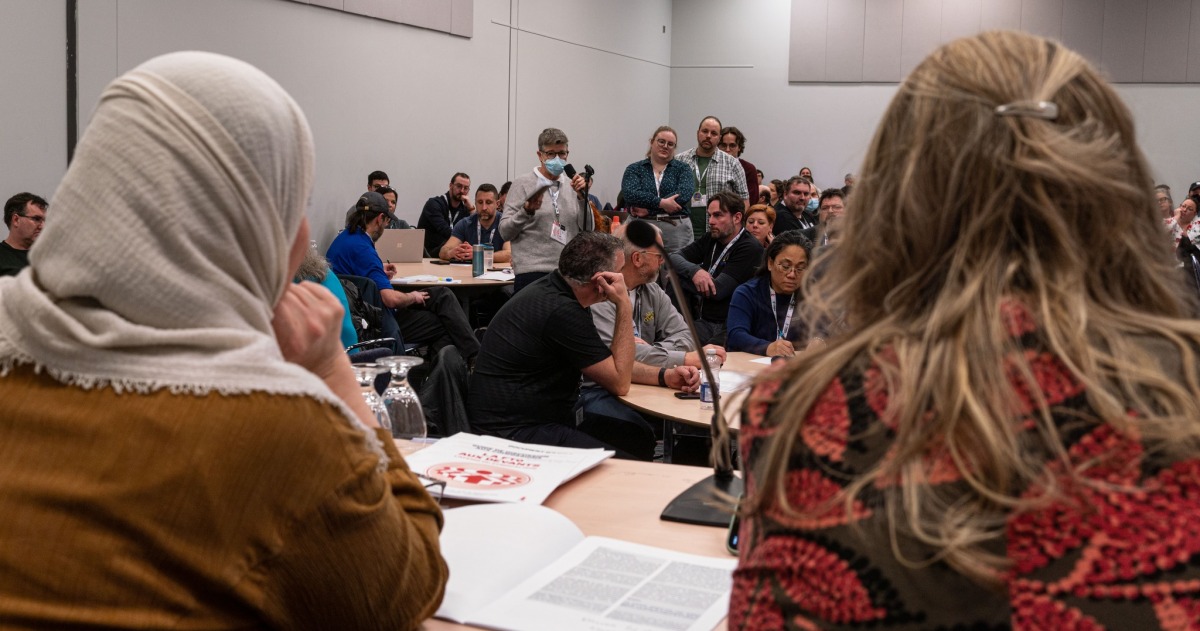March 13, 2023 - No. 12
Quebec Federation of Labour Holds 33rd Convention
• Policy Statement on the COVID-19 Pandemic
• Resolutions on Issues of Concern
Quebec Federation of Labour Holds 33rd Convention
For Greater Unity in Action in Defence of Rights and an Open Discussion on the Future of the Trade Union Movement

FTQ executive, January 19, 2023
From January 16 to 19, the Quebec Federation of Labour (FTQ) held its 33rd Convention under the theme "The FTQ in the Lead -- The Future of the Trade Union Movement." More than 1,000 delegates were present at all times during the convention, with the total number of participants, including observers and guests, approaching 1,200.
The main events were the speech by outgoing FTQ President Daniel Boyer, who retired after nine years as President and three years as General Secretary; the work in commissions on the Convention's theme; discussion on and adoption of the Policy Statement on the COVID-19 Pandemic, discussion on and adoption of a large set of resolutions; elections for President, General Secretary, and the FTQ's Board. The FTQ reiterated its initiative of calling for the holding of an Estates General on the trade union movement in the near future, aimed at mobilizing all Quebec unions in the discussion on the movement's future.
The Convention was marked by delegates' interventions on the need to build greater unity in action in defence of workers' rights and the rights of all members of society, and by discussions on the future of the FTQ and of the trade union movement. Building a more active FTQ in the fight for rights, where no one is left to fend for themselves and an FTQ which is more influential in public opinion so that workers' demands are advanced, was the focus of the Convention.
Speaking with passion, Congress participants declared that the issue of rights and the future of the trade union movement are brought to the forefront as a result of state attacks on living and working conditions and its attempts to silence workers' voices. In particular, participants denounced the fact that the COVID-19 pandemic crisis has been used as a means of increasing the concentration of power in the executive powers, such as through governance by ministerial decree, powers that cloaked themselves in immunity as they brutally attacked those who kept services going and saved lives at the risk of their own. This pushes workers to intensify their fight to force these executive powers to render account and to give way to new forms of decision-making that places those doing the work at the centre. Only in this way can the ever-increasing gutting and privatization of the health and social services system be halted.
Within this context, lively interventions were made on the need to build support for public sector workers' demands for substantial improvements to their conditions and to services through their efforts to renew their collective agreements. Delegates said they expect the Quebec government to follow the lead of Ontario's Ford government and attempt to impose wages and working conditions on public sector employees by refusing to negotiate and by preparing special legislation. Members of the private sector unions took to the mic to say that they will participate in any action in support of public sector workers and will not allow the government to impose conditions. Many expressed how inspired they were by the actions of education workers in Ontario challenging the Ford government's special legislation, forcing it to back down. The feeling is that if the Legault government chooses to follow suit, the same thing will happen in Quebec.
It was with this conviction that delegates spoke during the commissions on the Convention's theme and talked about revitalizing the structures of the FTQ, to further mobilize members and advance the fight for rights.
 Panel on the future of the FTQ, January 17,
2023
Panel on the future of the FTQ, January 17,
2023
It is within this same spirit that elections were held for the Federation's leadership. Magali Picard, a long-time activist with the Public Service Alliance of Canada, was elected FTQ President, the first woman and first Indigenous person to hold the position. During her remarks, she indicated that she intends to build upon the yearning for change expressed by the Convention, contributing to a more active FTQ on the ground in order to support and popularize the struggles of FTQ members, those of other unions and all those fighting for their rights and for social justice. Denis Bolduc was re-elected General Secretary and the Vice-Presidents, part of the FTQ Board, were also elected.
Workers' Forum participated in the Convention by interviewing workers on issues of concern to them and their views on the matters discussed at the Convention.
Work in Commissions

The entire afternoon of January 17 was devoted to the work in six commissions on the theme of the Convention "The FTQ in the Lead -- The Future of the Trade Union movement." More than 600 delegates participated in these commissions, a record number of participants according to the FTQ leadership. The Commissions Committee reported on the discussions on the morning of January 19. Like the entire Convention, the discussions in commissions focused on actions the FTQ must take now to prepare for the future.
The commissions discussed the development of the democratic life of the FTQ in the context of declining participation of its membership in FTQ bodies. The dominant aspect of the discussions on this subject was that the FTQ must revitalize its structures by opening them up more to open debates on issues of concern to workers in which members can present and share their opinions. The need to open up these debates to retirees from the FTQ was also raised. These debates are conducted with a view to carrying out actions that address the members and also public opinion, with the aim of influencing the course of events and highlighting the importance of workers and unions in society.
The issue of increasing the rate of unionization in Quebec, including increasing membership in the FTQ, to ensure the defence of workers' rights, was also at the centre of discussions. The issue of organizing the most vulnerable and precarious workers, including migrant workers, by addressing and defending their concerns was raised by many participants. Others said that the FTQ must pay special attention to its most vulnerable members while organizing to enlarge its membership. They mentioned in particular those working in private seniors' residences and residential and long-term care centres (CHSLDs) as attendants or in kitchens or maintenance who have the worst working conditions and are losing members to the private sector.
Many speakers pointed out that governments are aggressively attacking workers' rights and the rights of all vulnerable members of society, and are also attacking unions through decrees, special laws and disinformation that unions are defending special interests and not the people and society. This, they said, is also an obstacle to unionization and cannot be fought successfully without unions becoming more active in the public arena to defend the rights of all those under attack and to promote social justice.
The issue of developing forms that serve the content of the defence of rights was central to the discussions. Speakers emphasized that whatever approach is used to broaden the labour movement, workers must be part of the solution and mobilized in the process.
In the plenary session on the outcome of the work in commissions, the Convention adopted the following resolution:
"It is proposed that the Bureau of the FTQ prioritize the issue of unionization, in particular by considering the creation of a standing committee on this issue, in order to promote exchanges, the sharing of knowledge, and the optimization of collaboration between the affiliated unions."
Policy Statement on the COVID-19 Pandemic
The FTQ Convention unanimously adopted the Policy Statement on the COVID-19 pandemic[1] prepared by the Federation's Research Department. The statement examines in great detail the pandemic's impact on four major areas: jobs, society, politics and the economy. It proposes resolutions for each of these main sections.
The introduction to the statement reads:
"The vast majority of Quebeckers have taken note of the urgency to act, followed the health instructions and demonstrated their solidarity by supporting each other during these difficult times. It is the workers on the front lines who have kept the society functioning, often at the expense of their own health. In the face of this unprecedented crisis, the FTQ and its unions have worked hard to ensure that workers and the public are protected and supported.
"Besides exacerbating the existing problems, the pandemic has highlighted the flaws within the society. Job insecurity, low wages, an insufficient social safety net, a lack of adequate housing, systemic racism, violence against women, and a lack of resources and personnel in the health care system were all major vulnerabilities in the face of the virus. Inequalities became the fault lines. The state of the health emergency quickly became a pretext for governing by decree. The Quebec government relied mainly on individual responsibility, leaving aside collective and solidarity-based solutions.
" ... In the face of the indifference and recklessness of those in power, it seems necessary to take a few steps back to better understand what has happened and to demand reforms. Inevitably, Quebec and humanity will be confronted with other crises, whether of a sanitary, economic or climatic nature. We must be prepared for this.... This policy statement is also aimed at honouring the memory of all those who lost their lives to COVID-19 and to recognize the courage and sacrifice of the workers who kept Quebec together during this unprecedented crisis."
Following are some examples of how the statement examines the pandemic's impact in given areas and proposes a resolution:
"A Health Care System Under Intense Pressure"
It is under this title that the declaration examines the pandemic's impact on the health care system.
It points out:
"Already weakened by decades of neo-liberal cutbacks and reforms, the health care system has been severely tested during the pandemic. Without the dedication and sacrifice of workers, the situation would have been even worse. The disaster at the Herron CHSLD [residential and long-term care centre] caused consternation within the population. Not only did the elderly die from having contracted COVID-19, but also from malnutrition and dehydration. Because of the confinements, mental health problems increased while care was not readily available.
"As hospital admissions soared, thousands of surgeries had to be postponed. These problems were however predictable. For decades, the FTQ and its affiliated unions had issued numerous warnings without ever being taken seriously. Previous governments, who had ransacked the health care system, bear a heavy responsibility."
The document proposes the following resolution:
"BE IT RESOLVED THAT the 33rd Convention of the FTQ demand a consolidation of the public health and social services network through:
- massive reinvestments;
- a strengthening of the front line;
- additional resources for public health;
- a revision of the remuneration framework for physicians and of
their status;
- better working and employment conditions;
- a halt to privatization;
- an expansion of services offered to the population such as
home care and mental health care.
"An exacerbated housing crisis"
The statement reads:
"The lockdown and closure of public places was a reminder that decent housing is fundamental. The pandemic was particularly difficult for those living in substandard or overcrowded housing. People whose homes were not suitable for teleworking or online study had even more difficulty. With more limited shelter capacity, some women had to choose between insecurity and an abusive home environment. Poor housing quality was associated with greater risks of contracting COVID-19 and negative physical and mental health impacts. Unfortunately, housing issues have only gotten worse since March 2020 ..."
The proposed resolution:
"BE IT RESOLVED THAT the 33rd FTQ Convention demand that governments recognize the right to housing and implement a series of measures, including the massive construction of social and community housing, the creation of a lease registry, better rent increase oversight and fight against real estate speculation."
"Disturbing violations of rights and freedoms"
"The declaration of a health emergency has allowed the Quebec government to grant itself exceptional powers ... In the name of the health emergency, some of the rights provided for in the collective agreements of health and education workers have been suspended. Cancelled vacations, schedule changes and moves to other institutions have had catastrophic effects. The government also granted bonuses without negotiating with the unions. The FTQ has repeatedly called on the government to stop using coercion and that it consult with union organizations. In that respect, the government could and should have done better. Its authoritarian and non-transparent management has contributed to the exhaustion of personnel and has created inequities amongst workers. Many have been excluded from measures aimed in particular at improving their working conditions..."
Resolution:
"BE IT RESOLVED THAT the 33rd Convention of the FTQ demand amendments to the Public Health Act to better control, through democratic means, the government's power in the event of a health crisis and to hold it accountable.
"BE IT ALSO RESOLVED THAT the 33rd Convention of the FTQ demand that the Quebec government respect the right of association and stop imposing working conditions through decrees."
The statement includes several other themes within the main sections and corresponding resolutions. The delegates appreciated the serious work that had been accomplished in preparing it and adopted the declaration unanimously and with vigorous applause.
Note
1. FTQ Policy Statement on the COVID-19 Pandemic
(Translation from original French by Workers' Forum.)
Resolutions on Issues of Concern

Below are some of the many resolutions passed by the delegates at the convention that give a good idea of the breadth of concerns that animated the delegates and their determination to take action to address problems facing them and society.
Public Sector Negotiations
The resolution calls on the FTQ, all its affiliated unions and all its members to support public sector workers in their efforts to negotiate improved conditions and public services. The resolution demands that the government stop its management by ministerial order and its campaign to divide workers by any means.
Delegates from the private sector intervened to commit to take action in support of their public sector colleagues. Delegates warned that any attempt to pass legislation to impose conditions will be strongly opposed by all. One public sector worker said that special laws and ministerial orders make workers invisible, eliminate their voice and their demands, especially for the most vulnerable and those with the most precarious living and working conditions.
Health and Safety in the Workplace
The resolution mandates the FTQ Occupational Health and Safety Committee to develop an action plan, with the necessary budget, to force the Labour Standards, Pay Equity and Workplace Health and Safety Board (CNESST) to adopt regulations that allow for workers to have real control over prevention measures in the workplace.
One delegate noted that the Legault government's Bill 27, for the so-called modernization of the occupational health and safety system, attacks prevention by putting the issue in the hands of negotiations between employers and unions, who do not agree with one another, and in the hands of the CNESST and ultimately the government if there is no agreement. The workers are fighting to be in charge of prevention and training, and are demanding that the CNESST adopt regulations in this direction so that the flurry of workplace deaths and injuries can be stopped.
Federal Anti-Scab Legislation
The resolution calls for the adoption of anti-scab legislation at the federal level, which prohibits employers from using both external scabs (hired specifically to do the work normally done by striking workers) or internal scabs (who normally work in an employer's facilities) and provides for significant financial penalties for those who persist in using scabs.
The passing of the resolution was bolstered by the presence and intervention of workers under federal jurisdiction who are currently on strike or locked out. The sailors employed at the Ocean Remorquage ship-towing operation in Sorel-Tracy have been on strike since June 20, 2022, while the longshoremen at the Port of Quebec have been locked out since September 15, 2022, and in both cases they are being openly replaced by scabs. Affiliated unions and delegates collected donations during the Convention to support these workers, as well as those at the Société québécoise du cannabis (SQDC) who have been on strike since the end of May 2022.
Migrant Workers Seeking Full Status
The resolution demands that the federal and provincial governments grant permanent residence as quickly as possible to all workers, regardless of the work they do, who are waiting for their immigration status to be regularized, as well as to those who live without status and work in absolute precariousness while making an important contribution to society and communities.
The
resolution received a standing ovation from the entire assembly, an
expression of the strong feeling for unity in action in
defence of the rights and dignity of all, starting with workers in the most
vulnerable sectors in the most precarious conditions, which
animated the convention. An association in defence of migrants was also
present at the convention and its representative held discussions with
the delegates on the fight in which migrants and their allies are
engaged to get full status for all.
The resolution was a real
slap in the face of those who like to engage in Quebec-bashing by
claiming the Quebec people are xenophobic when they stand second to
none in defence of the working people from every corner of the globe.
Aboriginal Rights
The resolution urges the Quebec government to immediately adopt and implement the United Nations Declaration on the Rights of Indigenous Peoples and that the federal government actually implement it. It also calls on the Quebec government to speed up the implementation of the 142 Calls to Action of the Viens Report -- the Public Inquiry Commission on relations between Indigenous Peoples and certain public services in Québec: listening, reconciliation and progress -- and to adopt policies and practices consistent with the "Calls to Action" of the Truth and Reconciliation Commission of Canada. It also asks that the Quebec government adopt and recognize the holiday established by the federal government on September 30 as a National Day of Truth and Reconciliation.
This resolution was also greeted with a strong ovation from the whole convention, underscoring the strong fraternal relation between the people of Quebec and the Indigenous Peoples from whom many Quebeckers are descended to form the Quebec nation.
Quebec Election Act
The resolution calls on the FTQ to participate with all groups that are part of Quebec civil society to correct the electoral law, particularly with respect to the current restriction that the law imposes on their participation in electoral campaigns by treating them as third parties. All avenues must be considered, including political pressure on elected officials in the National Assembly, and going as far as taking legal action. The resolution reiterates that unions have a mandate to defend workers at all times, and this includes campaigning on election issues. The resolution states that the law prevents unions and other organizations from intervening freely during elections, depriving them of representation that is essential to them so as to achieve their goals.
A representative of a public sector union intervened in the discussion on the resolution and denounced prohibitions on unions publishing election materials and even orders made to them under the election law to remove election-related materials from their websites.
(To access articles individually click on the black headline.)
Website: www.cpcml.ca Email: editor@cpcml.ca


